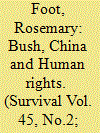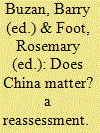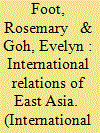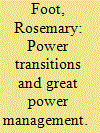|
|
|
Sort Order |
|
|
|
Items / Page
|
|
|
|
|
|
|
| Srl | Item |
| 1 |
ID:
055490


|
|
|
|
|
| Publication |
2003.
|
| Description |
p167-185
|
|
|
|
|
|
|
|
|
|
|
|
|
|
|
|
| 2 |
ID:
060986


|
|
|
|
|
| Publication |
Mar 2005.
|
| Summary/Abstract |
A number of states in the Asia-Pacific region have long been recognized to be indifferent or even hostile to the international human rights regime and to have rather poor records when it comes to protection of the right to personal integrity. Since 9/11 many of these same states have become closely involved in the US-led anti-terrorist campaign, and in the course of that involvement have been identified with the serious abuse of the personal security rights of those held in detention as terrorist suspects. This article uncovers some of the bases for that indifference to human rights treaties and why the human rights records of some of these states have become of even greater concern, particularly to domestic and transnational NGOs, in the contemporary anti-terrorist era. It argues that long-standing factors associated with intra-state armed conflict and separatist rebellions, the governmental tendency to accuse domestic NGOS of following a western rights agenda, and strong attachment to the non-interference norm have undercut official governmental concerns about the abuse of the right to personal security. More recently, emulation of the worst aspects of US anti-terrorist behaviour has given rise to a sense of impunity in some cases, and has justified a militarized response to political and religious unrest in others. Finally, the difficulties that the local human rights NGOs have had in making their case to the wider domestic populations have been compounded in a climate where many of their fellow citizens are fearful of the apparent rise in support for terrorist causes and methods.
|
|
|
|
|
|
|
|
|
|
|
|
|
|
|
|
| 3 |
ID:
104826


|
|
|
|
|
| Publication |
Cambridge, Cambridge University Press, 2011.
|
| Description |
xii, 340p.
|
| Standard Number |
9780521898003
|
|
|
|
|
|
|
|
|
|
|
|
Copies: C:2/I:0,R:0,Q:0
Circulation
| Accession# | Call# | Current Location | Status | Policy | Location |
| 056070 | 327.51073/FOO 056070 | Main | On Shelf | General | |
| 056701 | 327.51073/FOO 056701 | Main | On Shelf | General | |
|
|
|
|
| 4 |
ID:
134698


|
|
|
|
|
| Summary/Abstract |
The negotiations to create the U.N. Human Rights Council provided the Chinese government with opportunities to influence the design of the new body. China was unable to gain the necessary support to restrict the introduction of country-specific resolutions, but it received much support elsewhere without needing to use either coercion or inducement
|
|
|
|
|
|
|
|
|
|
|
|
|
|
|
|
| 5 |
ID:
061920


|
|
|
| 6 |
ID:
068633


|
|
|
| 7 |
ID:
051226


|
|
|
|
|
| Publication |
London, Routledge, 2004.
|
| Description |
xiv, 193p.: ill.pbk
|
| Standard Number |
0415304121
|
|
|
|
|
|
|
|
|
|
|
|
Copies: C:1/I:0,R:0,Q:0
Circulation
| Accession# | Call# | Current Location | Status | Policy | Location |
| 048146 | 951.05/BUZ 048146 | Main | On Shelf | General | |
|
|
|
|
| 8 |
ID:
134486


|
|
|
|
|
| Summary/Abstract |
A more powerful China under the seemingly confident leadership of President Xi Jinping has committed to a more activist global policy. In particular, this commitment has influenced Beijing's policy towards UN peacekeeping operations, with a long-awaited decision to add combat forces to the engineering troops and police and medical units that have been features of its past contribution. In addition, Beijing has doubled the size of its contribution to the UN peace operations budget. This article explains why the UN is a key venue for China to demonstrate its ‘responsible Great Power’ status and expressed willingness to provide global public goods. The main explanatory factors relate to the UN's institutional design, which accords special status to China even as it represents a global order that promotes the sovereign equality of states. Moreover, there are complementarities between dominant Chinese beliefs and interests, and those contained within the UN system. Especially important in this latter regard are the links that China has tried to establish between peacebuilding and development assistance with the aim of strengthening the capacity of states. China projects development support as a contribution both to humanitarian need and to the harmonization of conflict-ridden societies. The Chinese leadership has also spoken of its willingness to contribute to peacemaking through stepping up its efforts at mediation. However, such a move will require much deeper commitment than China has demonstrated in the past and runs the risk of taking China into controversial areas of policy it has hitherto worked to avoid.
|
|
|
|
|
|
|
|
|
|
|
|
|
|
|
|
| 9 |
ID:
006689


|
|
|
|
|
| Publication |
Ontario, York University, 1992.
|
| Description |
30p.
|
| Series |
NPCSD Working paper;16
|
|
|
|
|
|
|
|
|
|
|
|
Copies: C:1/I:0,R:0,Q:0
Circulation
| Accession# | Call# | Current Location | Status | Policy | Location |
| 037833 | 327.4/FOO 037833 | Main | On Shelf | General | |
|
|
|
|
| 10 |
ID:
051840


|
|
|
|
|
| Publication |
New York, International Institute for Strategic Studies, 2004.
|
| Description |
94p.
|
| Series |
Adelphi Paper; 363
|
| Standard Number |
0198550022
|
|
|
|
|
|
|
|
|
|
|
|
Copies: C:1/I:0,R:0,Q:0
Circulation
| Accession# | Call# | Current Location | Status | Policy | Location |
| 048289 | 325.320973/FOO 048289 | Main | On Shelf | General | |
|
|
|
|
| 11 |
ID:
064697


|
|
|
|
|
| Publication |
Jul-Sep 2005.
|
|
|
|
|
|
|
|
|
|
|
|
|
|
|
|
| 12 |
ID:
072907


|
|
|
|
|
| Publication |
2006.
|
| Summary/Abstract |
The language of war has a recognised and intimate relationship with the abuse of a core set of civil and political rights. Detention without trial, arbitrary arrest, disappearance, torture and the like soon result once a political authority decides to describe a conflict in which it is involved as 'war'. National or regime security takes centre stage, security ideologies play a stronger role, and the means employed push at the boundaries of the acceptable. This close association between conflict and human-rights abuse, if no other reason, should make us pause before we too readily resort to the language of war. The Cold War and the current 'global war on terror' - to use the US term - are no exceptions to this general finding. Disappearance, torture and extra-judicial killings have been features of both. The struggle against terrorism has generated a sense of impunity for actions that threaten many different groups.
|
|
|
|
|
|
|
|
|
|
|
|
|
|
|
|
| 13 |
ID:
168399


|
|
|
|
|
| Summary/Abstract |
East Asia is a region of signal importance for global order because of its economic dynamism and growing heft, China's challenge to the United States as incumbent regional and global hegemon, and other conflict hotspots like the Korean peninsula. This requires academic analysis that both appreciates the subtleties inherent to this region and can relate them to the wider systemic context. Many analysts have begun to allude to the challenging characteristics that are present in the international relations of East Asia, in particular struggling to explain how growing levels of economic interdependence can coexist with heightened security tensions. This article offers a research prospectus that suggests ways of analyzing these apparently contradictory trends. It proposes the development of research questions and approaches that are more suited to studying the international relations of a region with characteristics that we define as dual, hybrid, and contingent. We propose a Conjunctions Analytical Framework that explores what happens at the conjunctions of the regional-global and the unit-regional/global levels of analysis—the “grey areas” where social formations meet and interact. We aim to help shape the future study of the IR of East Asia and to suggest more effective ways of analyzing the complex reality of East Asia's regional and global politics.
|
|
|
|
|
|
|
|
|
|
|
|
|
|
|
|
| 14 |
ID:
155089


|
|
|
|
|
| Summary/Abstract |
What kind of challenge did a rising Japan in the 1970s and 1980s pose to the United States, and how does that differ from the challenge that China has posed to US primacy in East Asia since the early 2000s? This article compares and contrasts US responses to these two shifts in relative power, in the process aiming to elucidate how changes that portend a power transition are understood and dealt with and how great powers manage the security order at times of disruption. In these respects, the article contributes to the empirical understanding of why some power transitions do not result in conflict given the tools available to great powers to manage relations at times of stress.
|
|
|
|
|
|
|
|
|
|
|
|
|
|
|
|
| 15 |
ID:
006571


|
|
|
|
|
| Publication |
Oxford, Clarendon Pr., 1995.
|
| Description |
viii,291p.
|
| Standard Number |
0198278780
|
|
|
|
|
|
|
|
|
|
|
|
Copies: C:1/I:0,R:0,Q:0
Circulation
| Accession# | Call# | Current Location | Status | Policy | Location |
| 038318 | 327.73051/FOO 038318 | Main | On Shelf | General | |
|
|
|
|
| 16 |
ID:
165035


|
|
|
|
|
| Summary/Abstract |
In the century since the signature of the Treaty of Versailles, China's international status and material condition have been fundamentally transformed. The People's Republic has become powerful in ways that probably would have astonished the leaders of the early Republic of China, first established in 1911. These changes do not mean, however, that there are not potent legacies from China's nineteenth-century and Versailles-era experiences. In particular, the Versailles agreement showed China that gaining full membership of the international society of states would not be easy, despite its having joined the Allied side in the war effort. China's failure to gain either restitution of the territory of Shandong or proper acknowledgement of its status as a legally sovereign state added to the Chinese distrust of the West and Japan born out of their exploitative activities in China. The subsequent May Fourth nationalist demonstration of 1919 was the first of many prominent displays of nationalist outrage, a sentiment that provided opportunities for exploitation by successive Chinese governments. The article shows how the trials associated with removing China's unequal status in international politics condition and, in some respects, deform Chinese attitudes towards international politics to this day. In particular, it asks why China's remarkable resurgence has not changed official Chinese perceptions of world order, the tenor of its relations with other states and its view of its own place in international society more fundamentally than has in fact been the case.
|
|
|
|
|
|
|
|
|
|
|
|
|
|
|
|
| 17 |
ID:
001709


|
|
|
|
|
| Publication |
Ithaca, Cornell University Press, 1990.
|
| Description |
xv, 273p.hbk
|
| Standard Number |
0801424135
|
|
|
|
|
|
|
|
|
|
|
|
Copies: C:1/I:0,R:0,Q:0
Circulation
| Accession# | Call# | Current Location | Status | Policy | Location |
| 041302 | 951.9042/FOO 041302 | Main | On Shelf | General | |
|
|
|
|
| 18 |
ID:
072479


|
|
|
|
|
| Publication |
2006.
|
| Summary/Abstract |
The prohibition against torture has the status of a peremptory humanitarian norm. That is, it is considered binding on all states and no derogation under any circumstances is permitted. While the practice of torture has been widespread, until recently it had come to be understood that no representatives of the state could openly admit that they would use torture for fear of being removed from office and of having their state ostracized by 'civilized' nations. Why, then, given the rhetorical, moral and legal status of this prohibition, is torture being debated, contemplated and even resurrected as an unsavoury and allegedly necessary course of action in this counter-terrorist era? Why has the Bush administration set about trying to reduce the scope of what is meant by torture and degrading treatment, as well as to define a category of detainee who may be subjected to coercive methods of interrogation? And what efforts are being made to restore the status of a norm that has been seen as a distinctive kind of wrong? These are the main questions discussed in an article which examines the relationship between power and norms and the power of norms.
|
|
|
|
|
|
|
|
|
|
|
|
|
|
|
|
| 19 |
ID:
001711


|
|
|
|
|
| Publication |
Ithaca, Cornell University Press, 1985.
|
| Description |
290p.hbk
|
| Standard Number |
0801418003
|
|
|
|
|
|
|
|
|
|
|
|
Copies: C:1/I:0,R:0,Q:0
Circulation
| Accession# | Call# | Current Location | Status | Policy | Location |
| 041301 | 951.9042/FOO 041301 | Main | On Shelf | General | |
|
|
|
|
|
|
|
|
|